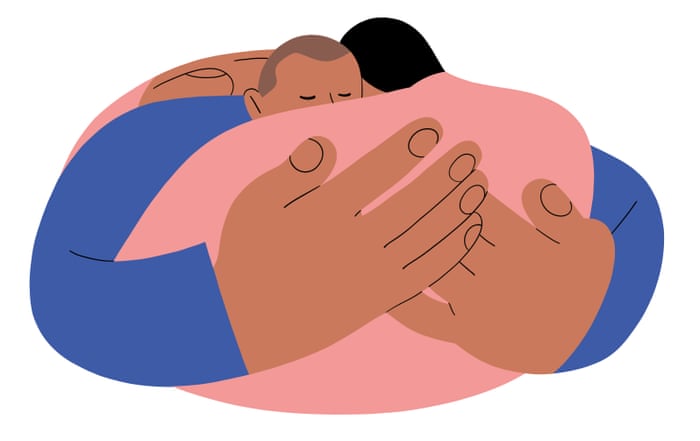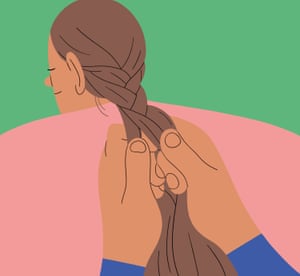 |
| ‘Touch is how we become part of this human community.’ Illustration: Alva Skog/The Guardian |
Touch saved me from loneliness. What will we become without it?
Touch is essential to our wellbeing, from the time we are babies. It’s how we transmit meaning, care, love and community. Our sudden loss of it has been agonising
Tue 21 April 2020
I
am afraid of what I will become without touch. Already the frayed edges are beginning to show. So much of my life and the lives of so many women is found through touch. We touch our babies, we hold them to our breasts and bellies, we wash our ageing mothers’ bodies and comb and braid our daughters’ hair. We massage and we pet and we soothe and we tickle. We do this with each other.
I have been blessed to feel and embrace and be embraced by women all over the world. To hold their stories and their hands, weep with them in my arms. We know how to do this, women. We know how to express loss and grief with our shuddering bodies and tears, transform our rage into medicine with the simplest caress. We know how the body is filled with microaggressions and macro ones. We know how to loosen ourselves into grieving and tighten ourselves into rage. And many of us are practised in that particular hug that shelters, that relieves, that confirms. Hugging is how we know we are here. How we feel each others’ existence and meaning and value and substance. How we transmit our love, our empathy, our care.
I am sure that so much of what we women do – so much of our so-called beauty routines – have as much to do with touch as they do with appearance. I cannot wait to have my hair washed at my hairdresser. There is one particular woman; I will call her Nina. Her hands are delicious and confident and kind, equally firm and gentle. When she digs her long, waltzing fingers into my scalp, mixed with the warm soapy water, I know salvation. The same with the woman who does my nails, the little hand massages, her fingers pressing deep into the stress of my palm, the flesh-to-flesh contact and energetic exchange. I need that. We need that. Particularly those of us who live alone, who don’t live with partners or spouses. Particularly those of us most likely to perish from the virus – the older ones. Touch is how we go on.I think of women hairdressers, manicurists, masseuses, nurses, caregivers, nannies, yoga teachers, acupuncturists, physical therapists. Who will they touch again and when?
The other night, the man I live with, James, a magical being, was playing and suddenly threw himself on top of me. His body was perfectly heavy and it felt unbelievably good to feel human weight, muscle flesh pressing down on me. It had nothing to do with sex, but everything to do with life, connection and vitality. He smushed me good. The imprint has lasted. These are desperate times.
We all know the significance of touch. We know babies who experience physical contact show increased mental capabilities in the first six months of life. Touch makes your brain grow. And we know that those seriously deprived become aggressive and develop behavioural problems. Touch is how we become part of this human community.
So here we are in the middle of this pandemic, knowing our cough can potentially kill; our body could be a lethal weapon. How do we make sense of this? How do we live with this unbearable skin hunger?
Part of the agony of this crisis is that even in death we are denied the possibility of touching the body. By four o’clock each afternoon, I can feel the disintegration begin. After a day of disembodied voices, blurred and frozen faces, loud news. After a day of ever-increasing numbers of the invisible dead, the bodies piling up in unseen warehouses, the back of huge trucks and cold-storage rooms. After a day of aerial shots of mass graves, wooden coffins stacked on top of each other like boxes of invisible pain. After a day of wanting to reach through the screen, the void, the isolation, to feel a heart beating, take someone’s hand, breathe with another’s breath, I can feel myself begin to disappear.
 |
| ‘The virus will not kill my yearning to touch you.’ Illustration: Alva Skog/The Guardian |
The body cannot and does not exist now. Not in life. Not in death. Thousands are disappearing without fanfare or acknowledgment, without family or ritual.
I want to make each body a person, each person real. I want to know their story and who they loved and what they were most proud of and where they first discovered beauty and what horizon they looked out on for most of their days. But death is moving so fast. You go to the hospital. You leave your loved ones. You don’t return. No touch, no closure, no body. Nobody. Nothing. No longer here.
I think of Claude Rains in The Invisible Man unwrapping the bandages around his head only to reveal there is absolutely nothing there. Nothing. No flesh, no face. No person. Nothing. I was 10 years old the first time I saw that movie. I remember vomiting and staying up the whole night in terror and being afraid of the dark after that. But it wasn’t the dark I was afraid of, it was the disintegration of the body, becoming meaningless, becoming nothing.
I discovered early the best defence against this horrifying dissolution was touch, kissing, massive amounts of physical contact, otherwise known as sex. I salvaged the world through my hands, body, mouth and skin. As a young woman, I needed to press my flesh against almost everything and everyone. Of course, misogynists interpreted this as promiscuous, loose. They called me a slut. But mine was an existential crisis. I needed touch. I needed physical connection. It saved me from unbearable loneliness. It allowed me to feel my impact on the world. It gave me pleasure and agency. It let me know that I existed, that I was here. It allowed me to fulfil my desire and heal the deepest physical wounds. It taught me trust might be possible and gave me undeniable moments of comfort.
A friend reported that a venture capitalist recently told her he saw a “touchless” future. I fear this is what the technocrats and AI people and fascists are dreaming of – a touchless future. The body has always been that lowly human thing that got in the way – messy desire and rage and passion and sex. I come from the land of the 60s. My consciousness was fashioned there in that ecstatic river of sex, drugs and rock’n’roll. There I learned that the body is the loci of revolution and change. So here, now, where our bodies are locked behind masks and gloves and screens and filters, where will the centre of our revolution lie? The quarantine is necessary. But we must ask ourselves: what kind of mutiny is possible in a quarantine?
I light a candle every night for those who have left the world that day. I imagine their faces. I sometimes am able to find their names. I touch the candle and feel the warmth of the flame on my body. I try to make them real. I allow myself to grieve their loss.
My act of resistance is simple. I will have a healthy respect and fear of the virus. I will maintain physical distancing for now. But I will not be afraid of your body.
I will not kill off my yearning to touch you. I will let it guide me. I will fantasise about it. I will write about it. I will draw it. I will remember us cuddling in January, mad dancing in the protest last July. I will feel the soft skin of your precious hand in mine. I will embrace you as you cry and cherish the wetness of your tears on my blouse. I will feel the fire of rage in my belly and the impossible sorrow in my throat. And I will learn over time how to translate this hunger for your body, for your burning skin, into the making of this most necessary new world.


No comments:
Post a Comment